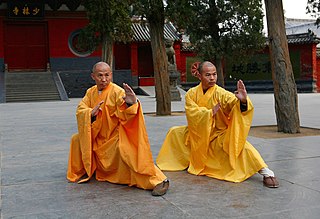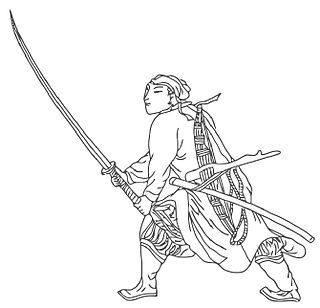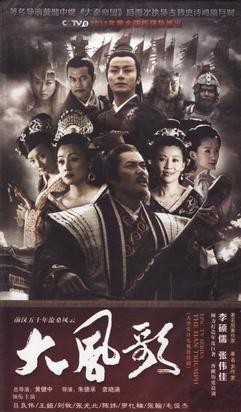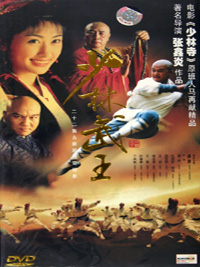Plot
The story is set in the late Ming dynasty, when corrupt officials dominate the government and the aggressive wokou (Japanese pirates) constantly raid China's coastal regions. General Qi Jiguang and his cousin, Qi Jiyu, organise a military force called the 'Qi Family Army' to resist the invaders. They score several victories over the enemy.
Oshima Masao, the wokou chief, is not content with defeat, so he bribes the eunuch Tong Dabao, a close aide of the incompetent emperor, to spread slanderous rumours about the Qi Family Army in the hope that the emperor will order the army to be disbanded. Qi Jiyu, assisted by his son Qi Shaozheng, manages to find evidence of Tong's treachery, and intends to report Tong to the emperor. However, Tong finds out, destroys the evidence, and has Qi Jiyu arrested and imprisoned. Tong then attempts to induce Qi Jiyu into accusing Qi Jiguang of treason by tempting him with promises of riches and fame but Qi Jiyu refuses. Qi Jiyu secretly tells Qi Shaozheng to escape and warn the Qi Family Army about Tong's plot.
Tong Dabao is furious when he learns that his plan has been foiled. He orders the execution of Qi Jiyu and his clan, and places a huge bounty on Qi Shaozheng's head. Qi Shaozheng flees to Shaolin Monastery for refuge and is accepted by Abbot Zhiyi as a student and is renamed "Tanzhi". When Tong Dabao discovers that Qi Shaozheng has survived, he sends the Jinyiwei to surround Shaolin and threatens to destroy the monastery if the monks do not hand over Qi. The monks refuse to capitulate so Tong orders Shaolin to be burnt down. Zhiyi dies in the blaze. Before his death, Zhiyi instructed a monk called Sanjiao to protect Tanzhi and bring the latter to the Southern Shaolin Monastery.
Tanzhi and Sanjiao travel to Southern Shaolin and encounter numerous dangers along the way. While in the wilderness, Tanzhi is injured but is saved by a girl called Xiaoni, and is forced by her grandfather to marry her. The old man is a former soldier in the Qi Family Army. When he learns of Tanzhi's true identity, he decides to allow the boy to proceed with his journey, much to his granddaughter's dismay. Tanzhi and Sanjiao later join a performance troupe by accident, where Tanzhi develops feelings for the maidens Baihe and Honglian. They leave after driving away Tong Dabao's henchmen and eventually arrive in Southern Shaolin, where Tanzhi becomes a student of Abbot Yuanzhao. In Southern Shaolin, Tanzhi befriends several seniors and meets a group of young nuns living near the monastery. He also gets involved in another romantic relationship with a Japanese girl who disguised herself as a man so that she can infiltrate Shaolin and learn martial arts.
Tanzhi trains hard in martial arts to fulfil his quest for justice. With strong backing and support from his friends and allies, he rebuilds the Qi Family Army and succeeds in defeating and driving away the wokou. He uses the powerful skills he mastered to overcome and kill Tong Dabao and avenge his family.

Zhang Sanfeng refers to a legendary Chinese Taoist who many believe invented T'ai chi ch'üan. However, other sources point to early versions of Tai Chi predating Sanfeng. He was purported to have achieved immortality.

Qi Jiguang, courtesy name Yuanjing, art names Nantang and Mengzhu, posthumous name Wuyi, was a Chinese military general and writer of the Ming dynasty. He is best known for leading the defense on the coastal regions against wokou pirate activities in the 16th century, as well as for the reinforcement of the Great Wall of China. Qi is also known for writing the military manuals Jixiao Xinshu and Lianbing Shiji or Record of Military Training (練兵實紀), which he based on his experience as a martial educator and defensive planner in the Ming military forces. He is regarded as a hero in Chinese culture.

Nanquan refers to a classification of Chinese martial arts that originated in Southern China.

The Shaolin Temple (少林寺) is a 1982 Chinese–Hong Kong martial arts film directed by Chang Hsin Yen and starring Jet Li in his debut role along with Ding Lan and Yu Hai in supporting roles. The film is based on the Shaolin Monastery in China and depicts Shaolin Kung Fu. The film was among the first major co-productions between Hong Kong and mainland China, and the first to be filmed in mainland China with a mostly mainland cast. The film's plot has an episodic storytelling structure while combining action, comedy and romance elements.

The changdao was a two-handed, single-edged Chinese sword. The term changdao has been translated as "long saber," "saber-staff," or "long-handled saber." During the Ming dynasty, changdao was often used as a general term for two handed swords. After Republican Era, the term miaodao is sometimes used to describe changdao due to similarity. Tang dynasty sources describe the changdao as being identical to the modao, but the modao may have been a double-edged weapon like earlier zhanmajian.

Zhou Tong was the archery teacher and second military arts tutor of famous Song dynasty general Yue Fei. Originally a local hero from Henan, he was hired to continue Yue Fei's military training in archery after the boy had rapidly mastered spearplay under his first teacher. In addition to the future general, Zhou accepted other children as archery pupils. During his tutelage, Zhou taught the children all of his skills and even rewarded Yue with his two favorite bows because he was his best pupil. After Zhou's death, Yue would regularly visit his tomb twice a month and perform unorthodox sacrifices that far surpassed that done for even beloved tutors. Yue later taught what he had learned from Zhou to his soldiers and they were successful in battle.
Yu Dayou (1503–1579), courtesy name Zhifu, art name Xujiang, was a Chinese general and martial artist best known for countering the wokou pirates along China's southeastern coast during the reign of the Jiajing Emperor in the Ming dynasty.
Emperor Yuan of Liang, personal name Xiao Yi (蕭繹), courtesy name Shicheng (世誠), childhood name Qifu (七符), was an emperor of the Chinese Liang Dynasty. After his father Emperor Wu and brother Emperor Jianwen were successively taken hostage and controlled by the rebel general Hou Jing, Xiao Yi was largely viewed as the de facto leader of Liang, and after defeating Hou in 552 declared himself emperor. In 554, after offending Yuwen Tai, the paramount general of rival Western Wei, Western Wei forces descended on and captured his capital Jiangling, executing him and instead declaring his nephew Xiao Cha the Emperor of Liang.
Emperor Xuan of Western Liang, personal name Xiao Cha (蕭詧), courtesy name Lisun (理孫), was the founding emperor of the Western Liang dynasty of China. He took the throne of the Liang dynasty with support from the Western Wei dynasty after Western Wei forces had defeated and killed his uncle Emperor Yuan in 554. However, scholars consider his regime, known as the Western Liang or Later Liang in historiography, to be separate from the Liang dynasty proper.
Empress Dowager Gong, formally Empress Dowager Yuan was an empress dowager of the Chinese dynasty Western Liang dynasty. She was the mother of Emperor Xuan of Western Liang who founded the Western Liang with the support of Western Wei.

Martial Arts of Shaolin, also known as Shaolin Temple 3: Martial Arts of Shaolin, is a 1986 Hong Kong–Chinese martial arts film. It is notable as the only collaboration between film director Lau Kar-leung and actor Jet Li. The film was later released on Region 1 DVD by The Weinstein Company under the Dragon Dynasty imprint.
Zhou Tong, the archery teacher of Song Dynasty General Yue Fei, has appeared in black-and-white films, wuxia novels, and folktales. He mainly appears in material dealing with Yue Fei, but also in media about his other students and his own biography and comic book.

The Jixiao Xinshu or New Treatise on Military Efficiency is a military manual written during the 1560s and 1580s by the Ming dynasty general Qi Jiguang. Its primary significance is in advocating for a combined arms approach to warfare using five types of infantry and two type of support. Qi Jiguang separated infantry into five separate categories: firearms, swordsmen, archers with fire arrows, ordinary archers, and spearmen. He split support crews into horse archers and artillery units. The Jixiao Xinshu is also one of the earliest-existing East Asian texts to address the relevance of Chinese martial arts with respect to military training and warfare. Several contemporary martial arts styles of Qi's era are mentioned in the book, including the staff method of the Shaolin temple.

Seven Swordsmen is a 2006 Chinese television series directed by Clarence Fok and produced by Tsui Hark. The series is loosely adapted from Liang Yusheng's wuxia novels Qijian Xia Tianshan and Saiwai Qixia Zhuan. It is also the television series counterpart to the 2005 film Seven Swords, which was also directed and produced by Tsui Hark. This series was originally planned to be the first season of a longer television series but the project seems to have been abandoned.

The Book and the Sword is a 2008 Chinese television series adapted from Louis Cha's novel of the same title. The series was first broadcast on CETV-3 in China in 2009. It starred Qiao Zhenyu, Adam Cheng, Niki Chow, and Liu Dekai.
Yu Chenghui, sometimes credited as Yue Sing-wai, was a Chinese actor, action director and martial artist.

Lian Cheng Jue is a Chinese television series adapted from Louis Cha's novel A Deadly Secret. The series was first broadcast on NMTV in China in 2004.

The Shaolin Warriors is a Chinese television series directed by Raymond Lee, starring Sammo Hung, Cui Lin, Christopher Lee, Jeanette Aw, Sammy Hung, Cui Peng, Liu Ying and Li Man. The series was first broadcast in November 2008 on CCTV-8 in mainland China. It is the first wuxia television series to filmed in direct collaboration with Shaolin Monastery and features some rarely seen martial arts techniques.

The Han Triumph, also known as Wind Ode, is a Chinese television series based on historical events in the early Han dynasty, beginning with the founding of the dynasty by Liu Bang after his triumph over Xiang Yu, and the events leading to the reign of Liu Heng. Directed by Huang Jianzhong, the series starred Ray Lui, Wang Ji, Liu Mu, Zhang Guangbei, Chen Wei and Li Qingxiang in the leading roles. It was first broadcast on CCTV-8 in China on 17 December 2011.
God of War is a 2017 Chinese historical war film directed by Gordon Chan and starring Vincent Zhao, Sammo Hung, and Yasuaki Kurata. It was released in the United States in Mandarin and Japanese with English subtitles on June 2, 2017. The plot is based on general Qi Jiguang's suppression of the wokou pirates during the Ming dynasty.













